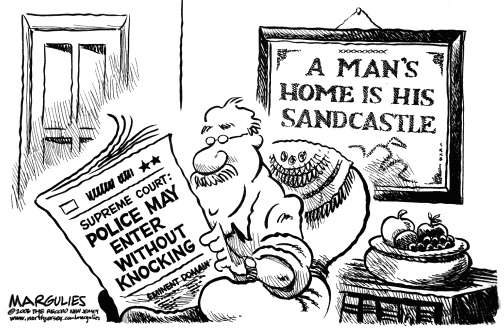Search
Democracy Links
Member's Off-site Blogs
the darkening of dreamland .....

The Constitution protects individuals against unreasonable searches, but for this protection to have practical meaning, the courts must enforce it.
This week, the Supreme Court let stand a disturbing ruling out of California that allows law enforcement to barge into people's homes without a warrant. The case has not prompted much outrage, perhaps because the people whose privacy is being invaded are welfare recipients, but it is a serious setback for the privacy rights of all Americans.
San Diego County's district attorney has a program called Project 100% that is intended to reduce welfare fraud. Applicants for welfare benefits are visited by law enforcement agents, who show up unannounced and examine the family's home, including the insides of cabinets and closets. Applicants who refuse to let the agents in are generally denied benefits.
The program does not meet the standards set out by the Fourth Amendment. For a search to be reasonable, there generally must be some kind of individualized suspicion of wrongdoing. These searches are done in the homes of people who have merely applied for welfare and have done nothing to arouse suspicion.
The United States Court of Appeals for the Ninth Circuit, based in San Francisco, rejected a challenge brought by welfare recipients. In ruling that the program does not violate the Constitution, the majority made the bizarre assertion that the home visits are not "searches."
The Supreme Court has long held that when the government intrudes on a person's reasonable expectation of privacy, it is a search for purposes of the Fourth Amendment. It is a fun-house mirrors version of constitutional analysis for a court to say that government agents are not conducting a search when they show up unannounced in a person's home and rifle through her bedroom dresser.- By John Richardson at 30 Nov 2007 - 9:45pm
- John Richardson's blog
- Login or register to post comments
Recent comments
2 hours 43 min ago
3 hours 48 min ago
3 hours 58 min ago
4 hours 17 min ago
4 hours 32 min ago
20 hours 36 min ago
21 hours 12 min ago
21 hours 17 min ago
1 day 15 min ago
1 day 2 hours ago